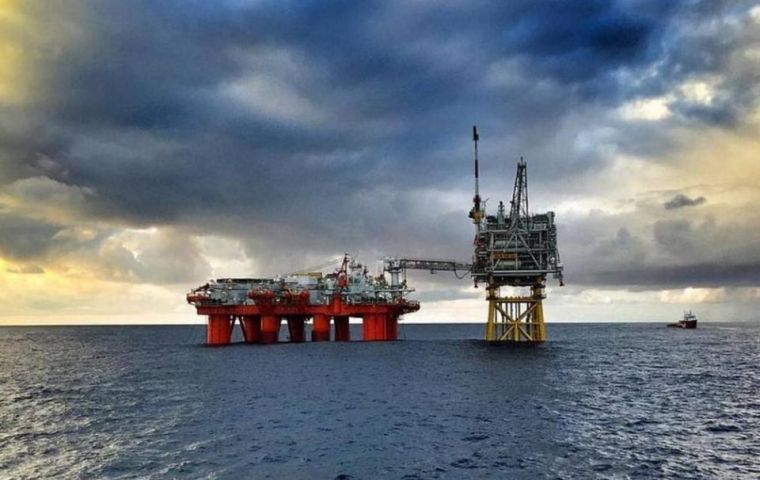MercoPress. South Atlantic News Agency
Mar del Plata fears offshore oil wells may end up damaging the city's economy
 The Atlantic coast off Mar del Plata: Fishing, tourism or oil. Can you win them all?
The Atlantic coast off Mar del Plata: Fishing, tourism or oil. Can you win them all? Argentina's government has issued an environmental impact declaration for offshore oil drilling off the coast of Mar del Plata which has prompted voiceful objections from local residents, particularly Mayor Guillermo Montenegro of the opposition Juntos por el Cambio (JxC), while Federal Energy Secretary Darío Martínez welcomed the decision.
Martínez said it was “a fundamental step to value the hydrocarbon resources available to the Argentine seabed and the reaffirmation of sovereignty over our maritime territory.”
ASSS“Thanks to a joint effort with national government agencies and a public hearing, with a wide margin of participation, we obtained the environmental impact declaration,” Martínez went on.
The Argentine government celebrated the granting of the environmental impact declaration to the offshore exploration areas CAN 100, CAN 108 and CAN 114, off the coast of Mar del Plata, for the seismic acquisition project presented by Equinor in partnership with YPF and Shell. CAN 100 and 108 are located 307 kilometers off the coast of Mar del Plata, while CAN 114 is 443 kilometers away.
Martínez also insisted “a fundamental step” had been taken “for more viable gas production for Argentines.” Offshore production has been developed in the country since the 1970s, with 280 wells between exploration and exploitation.
This environmental impact declaration, together with the measure adopted by the national State through Decree 870/21 which extends for up to two years the first exploratory period of the permits granted in the framework of Round 1, which includes the Area Can 100, CAN 108 and CAN 114, herald “a strong boost in offshore activity.”
Martínez also said offshore production was “a very important source of gas reserves, which represent 18%” of domestic consumption.
The official also underscored that “developing offshore areas is having a federal energy policy that is committed to enhancing all the country's productive basins and in this way intertwining with the local productive apparatus the goods and services that will be necessary to carry out their production.”
The Argentine Government also highlighted there had been “no incidents of an environmental nature or accidents with damage to the physical integrity of workers in more than 50 years of offshore development in Argentina.”
Martínez's statements came before Mar del Plata Mayor Guillermo Montenegro spoke out against offshore oil wells, which could have an environmental impact on the sea waters so dear to toursists who view the city as a beach resort. Fishing can also be affected in case of an oil spill, which would deal another blow to the city's economic development.
“From the Ministry of Energy, and in tune with a responsible and committed national government, we are going to verify that all operations in the energy framework are carried out with the most demanding international standards of environmental care,” said Martínez, adding that ”this is a fundamental step to value the hydrocarbon resources that the Argentine seabed has and, with it, the reaffirmation of sovereignty over our maritime territory.”




Top Comments
Disclaimer & comment rulesCommenting for this story is now closed.
If you have a Facebook account, become a fan and comment on our Facebook Page!